|
|
|
Sort Order |
|
|
|
Items / Page
|
|
|
|
|
|
|
| Srl | Item |
| 1 |
ID:
162482
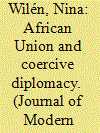

|
|
|
|
|
| Summary/Abstract |
In December 2015, the African Union (AU) took the unprecedented step of threatening to use military force against the government of Burundi's wishes in order to protect civilians caught up in the country's intensifying domestic crisis. This article traces the background to this decision and analyses the effectiveness and credibility of the AU's use of coercive diplomacy as a tool of conflict management. After its usual range of conflict management tools failed to stem the Burundian crisis, the AU Commission and Peace and Security Council tried a new type of military compellence by invoking Article 4(h) of the Union's Constitutive Act. We argue that the threatened intervention never materialised because of (1) the Burundian government's astute diplomacy and (2) several African autocrats’ resistance to setting a precedent for future interventions where concerns about civilian protection might override state sovereignty.
|
|
|
|
|
|
|
|
|
|
|
|
|
|
|
|
| 2 |
ID:
089343
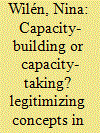

|
|
|
|
|
| Publication |
2009.
|
| Summary/Abstract |
This article critically analyses capacity-building and local ownership in the context of UN peace operations through interviews with UN staff and NGO representatives in Liberia and Burundi. The argument is that these concepts are left ambiguous and undefined to avoid accountability for peace operations while still functioning as value-adding and legitimizing discursive instruments for the latter. This article proves that the many paradoxes and contradictions surrounding the concepts clearly deter their operation in practice, while their positive connotations remain important, discursively, as legitimizing tools.
|
|
|
|
|
|
|
|
|
|
|
|
|
|
|
|
| 3 |
ID:
178118
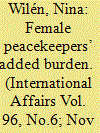

|
|
|
|
|
| Summary/Abstract |
Twenty years since the adoption of UN Security Council Resolution 1325 there is an almost unanimous call for an increased number of uniformed women in peace operations from policy-makers and multilateral organizations. This continuous push for the inclusion of more women is often justified by arguments about an increased operational effectiveness related to women's ‘added value’: both implicitly and explicitly advocating for greater gender equality. Yet, in this article, I contend that using instrumentalist arguments to increase the number of female peacekeepers may on the contrary undermine gender equality. This is related to the risk of producing self-fulfilling prophecies whereby female peacekeepers try to live up to the high expectations by fitting into gender-stereotypes and/or by working harder than their male colleagues. Rather than increase gender equality, such efforts risk transforming the female ‘added value’ to an ‘added burden’ which male peacekeepers do not have to carry. Anchoring the study in feminist theory with the aim to understand gendered relations of power, to illustrate my argument I draw on extensive interview material from military staff and peacekeepers in South Africa, Burundi, Belgium and Niger; interviews and informal discussions with female and male peacekeepers; and participation in several policy and research workshops on female participation in peacekeeping.
|
|
|
|
|
|
|
|
|
|
|
|
|
|
|
|
| 4 |
ID:
143791
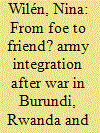

|
|
|
|
|
| Summary/Abstract |
This article examines the integration processes of rebel and government forces in three African armies after war with the aim of enhancing the understanding of which conditions and which actors drive these processes forward. In addition, the objective is to evaluate how successful these different processes have been and what effects they have had on the peacebuilding processes. The author adopts a comparative case study approach of Burundi, Rwanda and the Congo, and examines their respective integration processes. An altered version of Galtung's structural theory of integration is applied to identify different means, methods and results. The author finds that professionalization, socialization, welfare-provision and political education are all used to various extent to promote conditions for integration. The author argues that while a functional army capable of conducting major military operations is a sign of successful integration, it does not necessarily have a positive effect on the peacebuilding process if the relationship between the government and the army is undemocratic.
|
|
|
|
|
|
|
|
|
|
|
|
|
|
|
|
| 5 |
ID:
186998
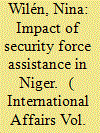

|
|
|
|
|
| Summary/Abstract |
How does Security Force Assistance (SFA) impact Niger's security sector and beyond? I draw on extensive fieldwork in Niger and identify and analyse two developments taking place in Niger's security sector: the development of an expanded Special Forces Command and the elaboration of multiple mobile hybrid units. I build upon, and contribute to, existing studies related to the politicization and securitization of borders in the Sahel and research discussing the blurring of borders between internal and external security forces. The aim is twofold: first, to unpack SFA efforts and effects through a focus on both geopolitical borders in Niger, and borders between and within corps and units in the security sector; and second, to contextualize and compare the developments in Niger's security sector with broader, global security trends. I find that both of the SFA projects constitute and feed into institutional games and inter-agency rivalry regarding task division, equipment and training. The overuse of the newly created Special Forces Command mirrors global trends of the latter as an ‘easy button to push’, while the multiplication of hybrid units to secure geopolitical borders reinforces the status and power of intermediary agencies that are at the interface between internal and external security forces. On an overarching level, the two trends of meddling with borders are found to be co-constituted by external and local actors who decide which developments that should be considered threats and how they should be addressed, questions that are deeply intertwined with power and control.
|
|
|
|
|
|
|
|
|
|
|
|
|
|
|
|
| 6 |
ID:
157715
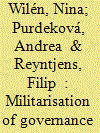

|
|
|
|
|
| Summary/Abstract |
In this article, we develop and expand the rebel-to-ruler literature to go beyond ‘rebel transformations’, in order to examine the transformation and militarisation of the entire post-genocide society in Rwanda. Through a historical and socio-political analysis of the military’s influence in post-genocide Rwanda, we argue that the adoption of military norms and ethos, drawn from an idealised and reconstructed pre-colonial history rather than simply an insurgent past, motivates the military’s centrality and penetration of all society’s sectors, economically, politically and socially, with the ultimate aim of retaining power in the hands of the rebels turned rulers. As such, the case demonstrates the need for an expansion of the rebel-to-ruler literature (1) beyond its concern with parties and regime type to a broader palette of governance effects and (2) beyond its singular focus on insurgent past and towards a longue-durée understanding of complementary causes
|
|
|
|
|
|
|
|
|
|
|
|
|
|
|
|
| 7 |
ID:
183891
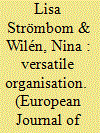

|
|
|
|
|
| Summary/Abstract |
What roles are military institutions expected to play in today's rapidly changing security environment? How are they supposed to interact with the society they are tasked to protect? These questions have been posed by classical military sociologists as well as by a newer generation of scholars. Yet so far, a comprehensive mapping of the military's potential roles in contemporary society is missing. In this article we contribute to an update of this debate by providing a categorisation of the different roles and tasks that the military institution plays in current industrialised democratic states. We identify three core roles, each divided into subroles, by drawing on an extensive reading of 70 National White Papers and Security Strategies from 37 OECD member states: (collective) defence, collective security, and aid to the nation. We analyse how these roles and tasks influence recent configurations in civil-military relations. This study thereby contributes with: (1) a useful illustration of the military's shifting roles and tasks in contemporary society; (2) increased understandings of how the different roles impact civil-military relations and related to this; and (3) a practical starting point for further analyses of the military organisation's internal challenges related to its, at times, contradictory roles.
|
|
|
|
|
|
|
|
|
|
|
|
|
|
|
|
|
|
|
|
|